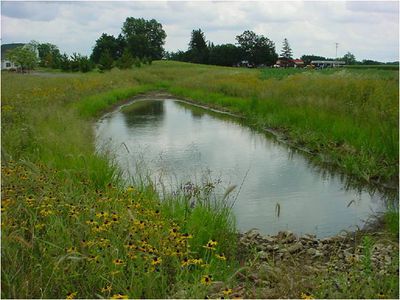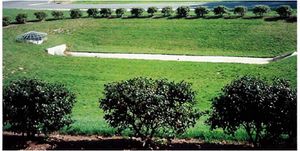
Difference between revisions of "Stormwater ponds"
m |
m |
||
| Line 1: | Line 1: | ||
[[File:Picture of a wet pond 2.jpg|right|thumb|400 px|alt=This photo shows a wet detention pond|Photo of a wet detention pond]] | [[File:Picture of a wet pond 2.jpg|right|thumb|400 px|alt=This photo shows a wet detention pond|Photo of a wet detention pond]] | ||
| − | + | [[File:Picture of a dry pond 1.jpg|right|300 px|alt=This photo illustrates an example of a dry pond|This photo illustrates an example of a dry pond]] | |
| − | |||
| − | |||
Generally speaking, the term “stormwater pond” may refer to any constructed basin that is built for the purpose of capturing and storing stormwater runoff, either temporarily or for an extended period of time, in order to prevent or mitigate downstream water quantity or quality impacts. Several distinct structure types (wet ponds, dry ponds, etc.) are included in this general category, and they are discussed in more detail below. | Generally speaking, the term “stormwater pond” may refer to any constructed basin that is built for the purpose of capturing and storing stormwater runoff, either temporarily or for an extended period of time, in order to prevent or mitigate downstream water quantity or quality impacts. Several distinct structure types (wet ponds, dry ponds, etc.) are included in this general category, and they are discussed in more detail below. | ||
Revision as of 14:30, 10 December 2012
Generally speaking, the term “stormwater pond” may refer to any constructed basin that is built for the purpose of capturing and storing stormwater runoff, either temporarily or for an extended period of time, in order to prevent or mitigate downstream water quantity or quality impacts. Several distinct structure types (wet ponds, dry ponds, etc.) are included in this general category, and they are discussed in more detail below.
The sections in this chapter may be viewed as a single page.
Stormwater ponds articles
A one page fact sheet for stormwater ponds provides overview information, a short summary of design, construction and maintenance considerations, and information on stormwater volume and pollutant removal.

